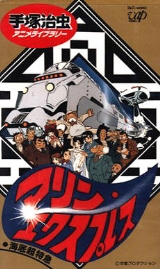
movie created for the Nippon Television Network's annual 24-hour charity program, "Ai wa Chikyu wo Suku", which roughly translates to "Love Saves the Earth". The movie contained a veritable "Who's Who" of Tezuka's notable characters
. Each one had an important role, and many of them had individual, intertwining stories which would overlap with the ones of others. To coincide with the central theme of the charity program, the movie emphasized on the danger's of environmental destruction, and that such disasters can be overcome by banding together.
For the previous charity special in 1978, Osamu Tezuka
and Tezuka Productions
created One Million-year Trip: Bander Book.
The truth emerging from this scattered picture of nuclear proliferation is simple: there is a stronger chance of a nuclear bomb being used now than at almost any point in the Cold War.![]()
The climate-change deniers are rapidly ending up with as much intellectual credibility as Creationism|creationists and Flat Earth Society|Flat Earthers... They are denying the reality of a force that — unless we change the way we live pretty fast — will kill millions.![]()
There is an emerging scientific consensus that global warming is making hurricanes more intense and more destructive. It turns out that Hurricane Katrina|Katrina fits into a pattern that scientists and greens have been trying to warn us about for a long time.![]()
My feeling about the war was — given a choice between these two things — obviously I want to see a world with much better choices than that — but given that was the choice we were confronted with, the best way through it was to try to find out what Iraqis prefer.![]()
The bombs held in current nuclear arsenals are seventy times more powerful than the bomb dropped on Nagasaki, Nagasaki|Nagasaki. If we don’t begin opposing the drift towards more and more of them, we will live in the shadow of the mushroom cloud for the rest of our lives — and millions may die there.![]()
For all the chatter that Britain has moved beyond class, recent studies have found that it determines the life chances of British people more today than at any point since the Second World War... A child born into a rich family in Britain will almost certainly live and die rich, while a child born into a poor family will almost certainly live and die poor.![]()
The greatest trick the rich — and their cheerleaders on the right — ever pulled was convincing the world that class didn’t exist. Out here in the real world, it is more real and more rigid than it has been for a century.![]()
The lamest defence I could offer — one used by many supporters of the war as they slam into reverse gear — is that I still support the principle of invasion, it's just the Bush administration screwed it up. ... The evidence should have been clear to me all along: the Bush administration would produce disaster.![]()
We are entering a world of rapidly multiplying nuclear stand-offs like this. India vs Pakistan. Iran vs Israel. America vs.China. Within decades, North Korea vs Japan and South Korea. Not one Cold War, but many — and the risk is doubled each time.![]()

